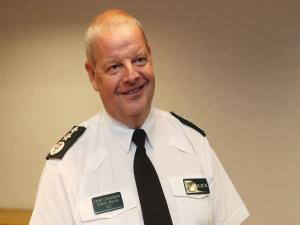
By Rebecca Black, PA
Northern Ireland’s police chief has expressed concern at ongoing uncertainty over Brexit.
Simon Byrne warned in his latest report to the region’s policing board that there is an unresolved funding shortfall around the current financial year.
He said a funding bid for a three-year plan for costs around the Northern Ireland Protocol has been submitted to the Treasury.
The protocol is due to come into effect on December 31.
The Chief Constable said the PSNI has prepared a number of scenarios, and are also refreshing operational readiness by “updating tactical plans in a number of key areas”.
“There is still a high level of uncertainty in relation to the UK Government’s ongoing negotiations with the EU and the potential for non-negotiated outcomes (NNOs) remains,” he noted in his report.
Mr Byrne said 300 officer posts are based on EU related funding, adding that the PSNI has “yet to receive any assurances as to the sustainability of that resource”.
Appearing at Thursday’s meeting of the Policing Board, Mr Byrne said: “Brexit is coming at us over the hill… clearly we need to remain on our front foot for preparations of making sure that legislation is joined up as best it can be, because we’re no clearer yet, is there going to be a deal or not.
“Clearly if there isn’t, we need to be able to mitigate some of the effects.”
Turning to coronavirus, Mr Byrne said the first fine issued over quarantine regulations this week should serve as a reminder that the rules are being policed.
He also announced a three-month pilot programme with Translink for police officers to be placed on the rail network to reduce antisocial behaviour and support staff.
Mr Byrne was questioned by Ulster Unionist MLA Mike Nesbitt about spit and bite guards, introduced by the PSNI earlier this year to protect officers amid the pandemic.
The Chief Constable responded: “I know it is a very emotive issue… we rolled them out in the Covid period to try and mitigate against the risk of what is and can be a fluid-borne disease.
“There is no unequivocal evidence that it reduces the risk of transmission in the medical sense, but clearly common sense would say that if you have got someone who is intent on spitting on somebody with saliva or blood, the risk of transmission would be higher – we want to mitigate that.
“Officers and staff should be given the kit they need to do the job but we need to mitigate the concerns about any abuse of human rights… we have seen some nasty incidents of spitting over the last few months.”
He added that the use of spit and bite guards is reviewed every month, with no concerns about their use reported so far.
Mr Byrne also revealed that of nine promotion offers to the rank of chief superintendent, two are women and one has a Catholic background.


 Woman assaulted while jogging in West Belfast
Woman assaulted while jogging in West Belfast
 Leading loyalist Winston Irvine sentenced to 30 months for firearms offences
Leading loyalist Winston Irvine sentenced to 30 months for firearms offences
 Rescue operation to free 40 cows after lorry overturns on motorway
Rescue operation to free 40 cows after lorry overturns on motorway
 New date set for trial of former DUP leader Jeffrey Donaldson and wife
New date set for trial of former DUP leader Jeffrey Donaldson and wife